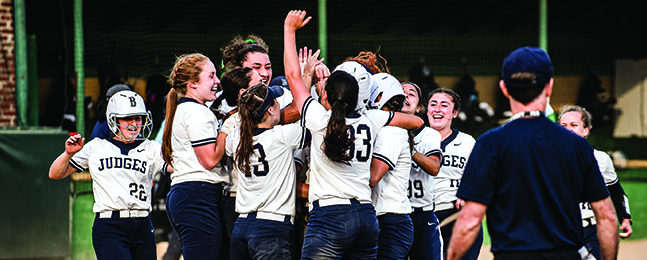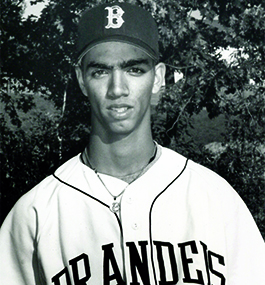Winning Isn’t Everything
The Judges strike a well-reasoned balance between athletics and academics.

The Brandeis softball team celebrates a victory.
by Ted Reinstein ’85, GSAS MFA’87
The best way to get a sense of 75 years of Brandeis sports is to start with the university’s mascot — a toothy white-haired judge in black robes named Louie.
“Not gonna lie — I was never totally sold on the mascot thing,” says Mike Coven, who coached men’s soccer at Brandeis for more than 40 years. “Judges? I wanted us to be the Nighthawks!”
Generally, school mascots tend toward the animal kingdom: Bulldogs, Beavers, Lions, Buffaloes. “Judges” suggests, well … definitely not wild. More like scholarly, civil, reasonable, cerebral.
Coven’s team won a national Division III championship in 1976. He retired in 2016 with a lifetime record of 526 wins, making him 12th all-time among NCAA coaches. If Brandeis’ mascot rubbed him the wrong way, he was totally sold on Brandeis, its academic rigor, and its student-athletes.
In fact, Coven’s four-decade career in Waltham could have been much briefer. After the ’76 title, the job offers poured in. “Yeah, I could’ve made more money,” he acknowledges. “But I realized something. All the good things about Brandeis that I told prospective students, I believed them with all my heart. Such good people, the joy, the relationships — three of my former players, I later coached their sons — how do you put a price on that?”
Former women’s soccer coach Denise Dallamora, a longtime colleague of Coven’s, relates entirely. “I loved working at Brandeis, from my first day to the last,” she says. “I really did.”
 |
|
Sidebar Story |
 |
Dallamora, who retired in 2020, also coached at Brandeis for four decades. She ranks 14th all-time for Division III victories, and was inducted into the Joseph M. Linsey Brandeis Athletics Hall of Fame last year, alongside Coven.
“I’ll never forget coaching in the Final Four,” Dallamora recalls. “Sure, there were challenges over the years, but the friendships were so wonderful — the camaraderie between players, other coaches, and the administration and staff.”
The tilt toward academics over athletic prowess is pronounced at Brandeis. According to Lauren Haynie, the school’s current (and third female) athletics director, “The perception of the academic priority at Brandeis is very real. Student-athletes know they are going to go through the same admissions process as any other potential student. The academics have to be there.”
Indeed, as a Division III school in the University Athletic Association, Brandeis does not offer athletic scholarships.
Benny Friedman, the university’s first athletic director and a legendary pro quarterback from the 1930s (inducted into the Pro Football Hall of Fame in 2005), insisted on having a football team at Brandeis. He got one. They even beat Harvard in their first pre-varsity exhibition game, in 1950.
But he heard little cheering at his school. Before long, football and Friedman would depart, the former in 1959 and the latter in 1963.
“There was a feeling at Brandeis in those earlier days that the priority had to be academics, not sports,” says Coven. “They had to find that balance that felt right and true. Football just didn’t fit.”
Sports information director Adam Levin ’94, Rabb MS’21, puts it this way: “At the end of the day, whether the wins or losses are there, our students are still successful.”
Former women’s soccer captain Morgan Clark ’23 agrees. “Every single one of my coaches cared immensely about my college academic experience,” says the Health: Science, Society, and Policy major and legal studies minor. “If I hadn’t had that, I wouldn’t have had such a successful academic or athletic experience.”
“Coaches here understand they’ll have students leaving early or arriving late from a lab, for example,” says Haynie. “Students understand that, too. They want to win, they want to play, but they know they’re not going pro, either.”
Well, not usually.
“When I arrived at Brandeis, my academic adviser asked me what I wanted to do,” recalls Nelson Figueroa ’98. “I said, ‘I want to be a professional baseball player.’ He said, ‘Very funny.’ He said, ‘That’s not why you come to Brandeis.’”

Nelson Figueroa ’98
page 2 of 2
But Figueroa, who majored in American studies, had the last laugh. A gifted right-handed pitcher who starred on the Brandeis baseball team, he went on to a 10-year career in Major League Baseball.
“The best part?” says Figueroa (who met his wife, Alisa Albert ’94, at Brandeis). “At my graduation, handing me my degree, my adviser, Professor Jerry Cohen, told the crowd, ‘Nelson Figueroa can say something Sandy Koufax can’t say: “I’m a graduate of Brandeis.”’ I’ll never forget it.”
Years later, Figueroa sent his first Major League Baseball card to Cohen, now professor emeritus of American studies.
On a recent sunny, brisk April afternoon, I thought of Figueroa. I was shuttling between two fields at Brandeis, taking in a baseball game and a softball game. The baseball squad was down 5-0 after an inning. Can’t win ’em all.
At the softball field, I was so impressed by the Brandeis pitcher’s speed, I turned and asked a student in the stands who she was.
“Ragini Kannan,” Aiden Guthro ’23 replied cheerfully. (Kannan is a rising sophomore, which bodes well for Brandeis. The Judges went on to win that game 3-1.)
I asked Guthro, an independent interdisciplinary major in communications and media studies, and former captain of the men’s soccer team, about sports at Brandeis.
“I could have potentially gone to a Division I school,” he said. “But I wouldn’t have played nearly as much — or frankly, learned as much — as I have here. It’s a Division I mentality, Division I schedule, and Division I practice in a Division III league.”
With a mascot in a league of its own.
Seventy-five years after the university’s creation, I suspect Justice Louis D. Brandeis would like the sports-academics balance that’s been struck at the school that bears his name.
I bet he’d also like watching Ragini Kannan fire a strike, and the way those deep-blue, big block letters — “JUDGES” — emblazon the front of that home uniform.
Ted Reinstein is an award-winning correspondent for “Chronicle,” WCVB Boston’s nightly newsmagazine, and the author of four books, including “Before Brooklyn: The Unsung Heroes Who Helped Break Baseball’s Color Barrier” (Lyons Press, 2021).
